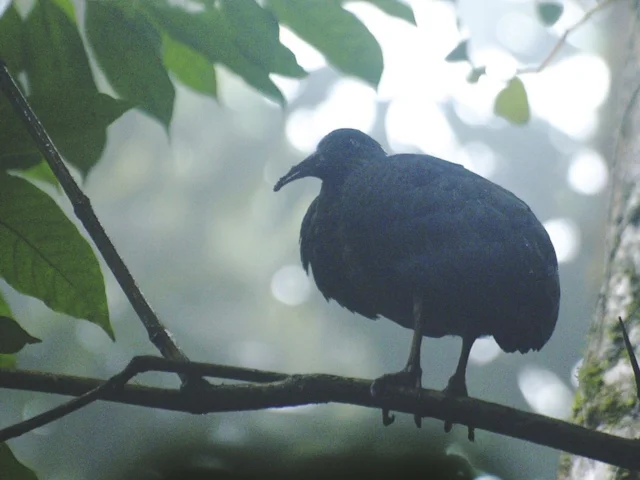Conservation plan for Africa's endemic paradise
027f6113-bb77-4a11-8466-519cc5b9c6be

BirdLife and the government of São Tomé and Príncipe unveiled conservation plans for saving some of the most threatened birds in Africa this week.
The São Tomé e Príncipe International Species Action Plans for Critically Endangered bird species was unveiled as part of a BirdLife International initiative to ensure protection of priority forest habitats on São Tomé to reduce the extinction risk of Critically Endangered birds and benefit other globally threatened endemic wildlife. The plans will guide the government and other stakeholders in the conservation of threatened birds of the São Tomé islands, off the coast of Gabon, West Africa.
The Plans focus on three Critically Endangered birds, namely Dwarf Olive Ibis, São Tomé Fiscal and São Tomé Grosbeak. A separate plan has been developed for Príncipe Thrush, another critically endangered bird found on Príncipe, and will be launched in the near future.
The islands of São Tomé e Principe are extraordinary in terms of the richness and uniqueness of the species found there. They are one of Africa’s major centres of wildlife endemism (including 28 endemic bird species), and the forests on the islands have been classified as the second most important for biodiversity conservation in Africa. Sadly, this exceptional biodiversity is under serious threat, mainly in the form of habitat loss and habitat degradation powered by agricultural expansion and intensification (in particular, palm oil plantations). Another key threat is increased mortality from hunting for food by humans and predation by introduced species.
Present at the launch were other senior government officials from the ministries of agriculture and the environment, Directors of Obo Natural Park in Sao Tome and in Principe, professional research field guides and members of NGOs addressing biodiversity and livelihood issues around Obo Natural Park. Ms Alzira Rodrigues, the President of Associação de Biólogos Santomenses (ABS) which has been working with BirdLife since 2006 and helped train many of the field guides, attended the launch.
Julius Arinaitwe, BirdLife Regional Director for Africa, said: “The International Species Action Plans launched today by the government of Sao Tome will stimulate the much-needed collaboration and partnerships to engage government, general public and the private sector in research and action to conserve biodiversity in São Tomé. BirdLife is grateful for the opportunity to bring together these plans and will continue to play its part as one of the partners contributing to São Tomé and Príncipe’s conservation journey.”
The São Tomé e Príncipe International Species Action Plans for Critically Endangered bird species was unveiled as part of a BirdLife International initiative to ensure protection of priority forest habitats on São Tomé to reduce the extinction risk of Critically Endangered birds and benefit other globally threatened endemic wildlife. The plans will guide the government and other stakeholders in the conservation of threatened birds of the São Tomé islands, off the coast of Gabon, West Africa.
The Plans focus on three Critically Endangered birds, namely Dwarf Olive Ibis, São Tomé Fiscal and São Tomé Grosbeak. A separate plan has been developed for Príncipe Thrush, another critically endangered bird found on Príncipe, and will be launched in the near future.
The islands of São Tomé e Principe are extraordinary in terms of the richness and uniqueness of the species found there. They are one of Africa’s major centres of wildlife endemism (including 28 endemic bird species), and the forests on the islands have been classified as the second most important for biodiversity conservation in Africa. Sadly, this exceptional biodiversity is under serious threat, mainly in the form of habitat loss and habitat degradation powered by agricultural expansion and intensification (in particular, palm oil plantations). Another key threat is increased mortality from hunting for food by humans and predation by introduced species.
Present at the launch were other senior government officials from the ministries of agriculture and the environment, Directors of Obo Natural Park in Sao Tome and in Principe, professional research field guides and members of NGOs addressing biodiversity and livelihood issues around Obo Natural Park. Ms Alzira Rodrigues, the President of Associação de Biólogos Santomenses (ABS) which has been working with BirdLife since 2006 and helped train many of the field guides, attended the launch.
Julius Arinaitwe, BirdLife Regional Director for Africa, said: “The International Species Action Plans launched today by the government of Sao Tome will stimulate the much-needed collaboration and partnerships to engage government, general public and the private sector in research and action to conserve biodiversity in São Tomé. BirdLife is grateful for the opportunity to bring together these plans and will continue to play its part as one of the partners contributing to São Tomé and Príncipe’s conservation journey.”

